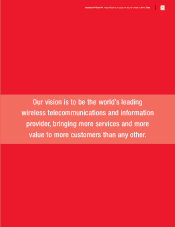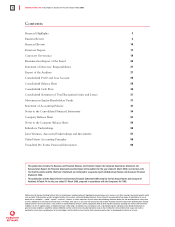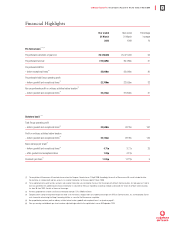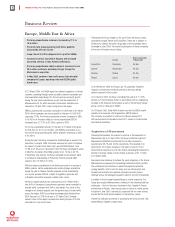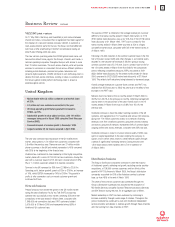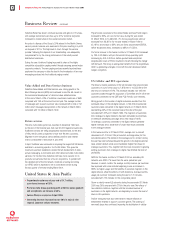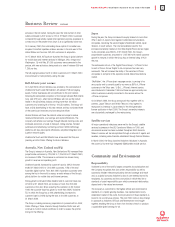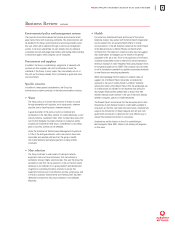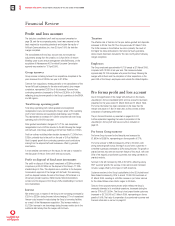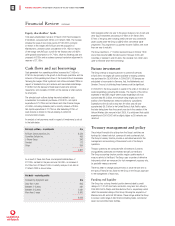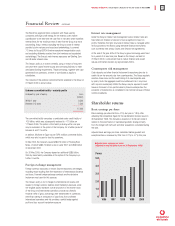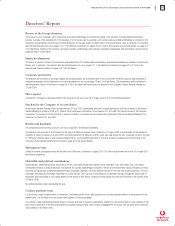Vodafone 2000 Annual Report Download - page 7
Download and view the complete annual report
Please find page 7 of the 2000 Vodafone annual report below. You can navigate through the pages in the report by either clicking on the pages listed below, or by using the keyword search tool below to find specific information within the annual report.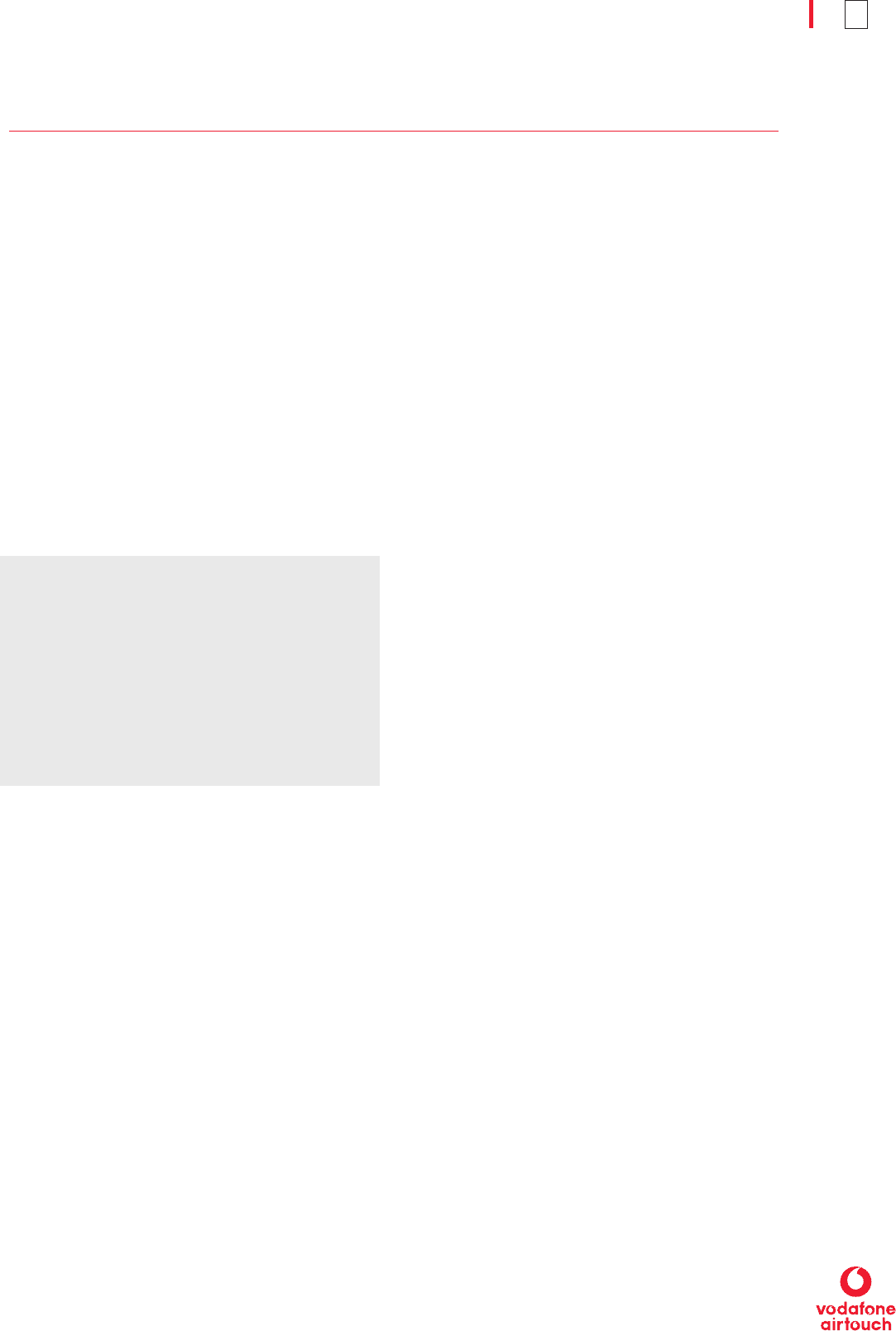
Vodafone AirTouch Plc Annual Report & Accounts for the year ended 31 March 2000 5
Business Review continued
VIZZAVI joint venture
On 17 May 2000, the Group and VivendiNet (a joint venture between
Vivendi and Canal+) announced that an agreement had been signed for
the creation of a new joint venture company, VIZZAVI, to establish a
multi-access Internet portal for Europe. The Group and VivendiNet will
both have a 50% shareholding in VIZZAVI and anticipate making an
Initial Public Offering within two years.
The new venture, operating under the VIZZAVI global brand name, will
become the default home page for the Group’s, Vivendi’s and Canal+’s
national operating companies throughout Europe, with access to more
than 70 million customers. The multi-access Internet portal will provide
services to customers in a consistent format across different platforms,
including mobile handsets, personal computers, televisions and
personal digital assistants. VIZZAVI will have its own technology team to
develop the multi-access interfaces, working in close co-operation with
the Group’s global mobile platform technology team to ensure a
seamless global service.
United Kingdom
•Market leader with 8.8 million customers and market share
of 32%.
•3.2 million net new customers connected in the year.
•UK Group operating profit before goodwill increased to
£706m, up 10%.
•Substantial growth in value added services, with 141 million
messages being sent in March 2000 using the Short Message
Service (SMS).
•Successful launch of wireless portal in December 1999.
•Largest available UK 3G licence acquired in April 2000.
The year saw continued rapid expansion in the UK mobile phone
market, which grew by 12.4 million new customers compared with
5.8 million the previous year. There are now over 27 million mobile
phone customers in the UK and market penetration is 46% compared
with 26% at the beginning of the financial year.
Vodafone has maintained its clear leadership in this highly competitive
market-place with a record 3,216,000 net new customers, closing the
year with a customer base of 8,791,000 and a market share of 32%,
5% or 1.4 million customers ahead of its nearest competitor.
Turnover in the UK increased by 39% from £2,088m to £2,901m.
Operating profit, before goodwill, grew by £62m to £706m, an increase
of 10%, whilst EBITDA increased by 14% to £934m. This growth in
profits is after connection costs on record customer growth and
continued tariff cuts.
Network business
Prepaid products have driven the growth in the UK mobile market
during the year. Vodafone’s Pay As You Talk (PAYT) product has
operated very successfully in this market, achieving 3,233,000 net
connections in the year ended 31 March 2000, compared with
1,648,000 net connections last year. PAYT customers totalled
5,079,000 at 31 March 2000 and represented almost 58% of
Vodafone’s UK customer base.
The success of PAYT is reflected in the average revenue per customer
(ARPU) for the twelve months ended 31 March 2000 which, at £175
(£199 before trade discounts), was up by 10% from £159 (£178 before
trade discounts) at 31 March 1999. PAYT cost to connect for the
twelve months ended 31 March 2000 was held at £50 in a highly
competitive market-place, compared with £43 in the twelve months to
31 March 1999.
Following a 55,000 reduction in the contract customer base in the first
half of the year, revised tariffs and other changes to commercial policy
resulted in a net second half increase of 38,000, giving a closing
contract customer base of 3,712,000. Cost to connect rose to £94 for
the 12 months ended 31 March 2000 from £88 for the comparable
period, reflecting competitive pressures. ARPU was stable at £421
(£554 before trade discounts) for the twelve months ended 31 March
2000 compared to £423 (£553 before trade discounts) at 31 March
1999. This reflects tariff reductions being balanced by increased usage.
Overall average revenue per customer (both contract and PAYT) has
declined from £378 last year to £305 this year due to the effect of the
increase in the PAYT base.
Network churn has fallen in the six months ended 31 March 2000 to
28.3% from 33.2% in the previous six months, reflecting management
actions taken in the second half of the year. Overall churn in the 12
months ended 31 March 2000 rose to 29.8% from 26.0 % the
previous year.
Vodafone continues to have the widest roaming capability of the UK
operators, with agreements in 107 countries and across 234 networks,
giving over 170 million customers access to its network. Roaming
revenues, both from Vodafone customers using their phones overseas
and visitors using the UK network, represented 24% of contract digital
outgoing airtime and access revenues, compared with 23% last year.
Vodafone continues to invest to improve network quality. £523m was
spent on capital expenditure in the year, enabling the company to
sustain, and in certain areas improve, overall network quality through
a period of significantly increasing demand. During the year over
1,600 base stations were installed, with 6,700 in operation at
31 March 2000.
Distribution business
The Group’s distribution companies continued to drive the majority
of Vodafone’s growth, achieving net growth, excluding service provider
acquisitions, of 198,000 contract customers and two thirds of the
growth in PAYT. By the end of March 2000, the Group’s distribution
companies accounted for 63% of the Vodafone contract customer
base, up from 48% at the end of March 1999.
The share of the contract customer base connected through the
Group’s distribution businesses was boosted by the acquisition of
MC Mobile Services, UniqueAir, Scottish Telecommunications (Services)
and 3@ Telecom during the year, for an aggregate cost of £84m.
Market leadership on PAYT has been sustained by continuing to
increase availability through a wide range of retailers. Throughout the
period, Vodafone has continued to work with traditional independent
service providers and dealers to balance growth through these channels
with that coming from new channels on PAYT.



